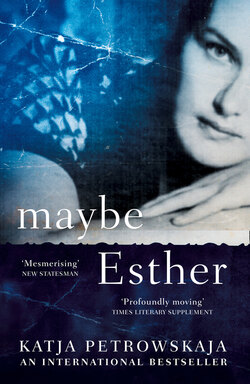Читать книгу Maybe Esther - Katja Petrowskaja - Страница 13
IN THE MUSEUM
ОглавлениеI wanted to go back up and look at the bicorne that Napoleon lost at Waterloo, but my daughter dragged me down to the ground floor for the twentieth century. I sought to distract her with Dürer and Luther, but in vain; she brought me to the 1920s, where we raced through the strikes, the hunger, and Berlin’s golden age, for she wanted to go on, to go there, and as we neared the 1930s, I tensed up. She pulled me along to join up with a tour for adults; Let’s not, I said, but she reassured me, I know the score, Mama, and her comfort with the subject discomfited me more than her knowledge. She was eleven. We strode through the seizure of power, the ban on forming associations, the persecution of Communists, and when we were standing in front of the chart with the Nuremberg Laws and the tour guide—the Führerin, funny that’s the word for the woman doing this job, she was just in the middle of talking about the Führer—launched into an explanation of who, and what percent, my daughter asked me in a loud whisper, Where are we here? Where are we on this chart, Mama? The question really ought to be asked not in the present tense but in the past, and the subjunctive: where would we have been if we had lived then, if we had lived in this country—if we had been Jewish and had lived here back then. I know this lack of respect for grammar, and I, too, ask myself questions of this sort, where am I on this picture, questions that shift me from the realm of imagination into reality, because avoidance of the subjunctive turns imagination into recognition or even statement, you take another’s place, catapult yourself there, into this chart, for example, and thus I try out every role on myself as though there was no past without an if, as though, or in that case.
Where are we on this chart, Mama? my daughter asked. I was frightened by her directness, and to protect her from being frightened, I hastened to reassure her that we were not on it at all, we would have been in Kiev by that point or already evacuated, and by the way we weren’t even born yet, this chart has nothing to do with us, and now I had almost said if, but, and as though after all, when a man from the guided group turned to me and said, By the way, we have paid.
Even before I understood that he was telling me that the guided tour was not free of charge and that he thought that I too should pay or we would be freeloaders, my daughter and I, as though we had filched this eight-euro history, although, thanks anyway, I would not filch this kind of thing, so before I understood that without paying we had no right to stand in front of the chart or on it, that we had come to the paying circle too late; even before or as I thought all of that, tears came to my eyes, although I wasn’t crying at all, something was crying in me, I was cried for, and also the man was cried for within me, although he had no need of it, because he was in the right, we hadn’t paid, or rather, we actually had, but there is always someone who hasn’t.
